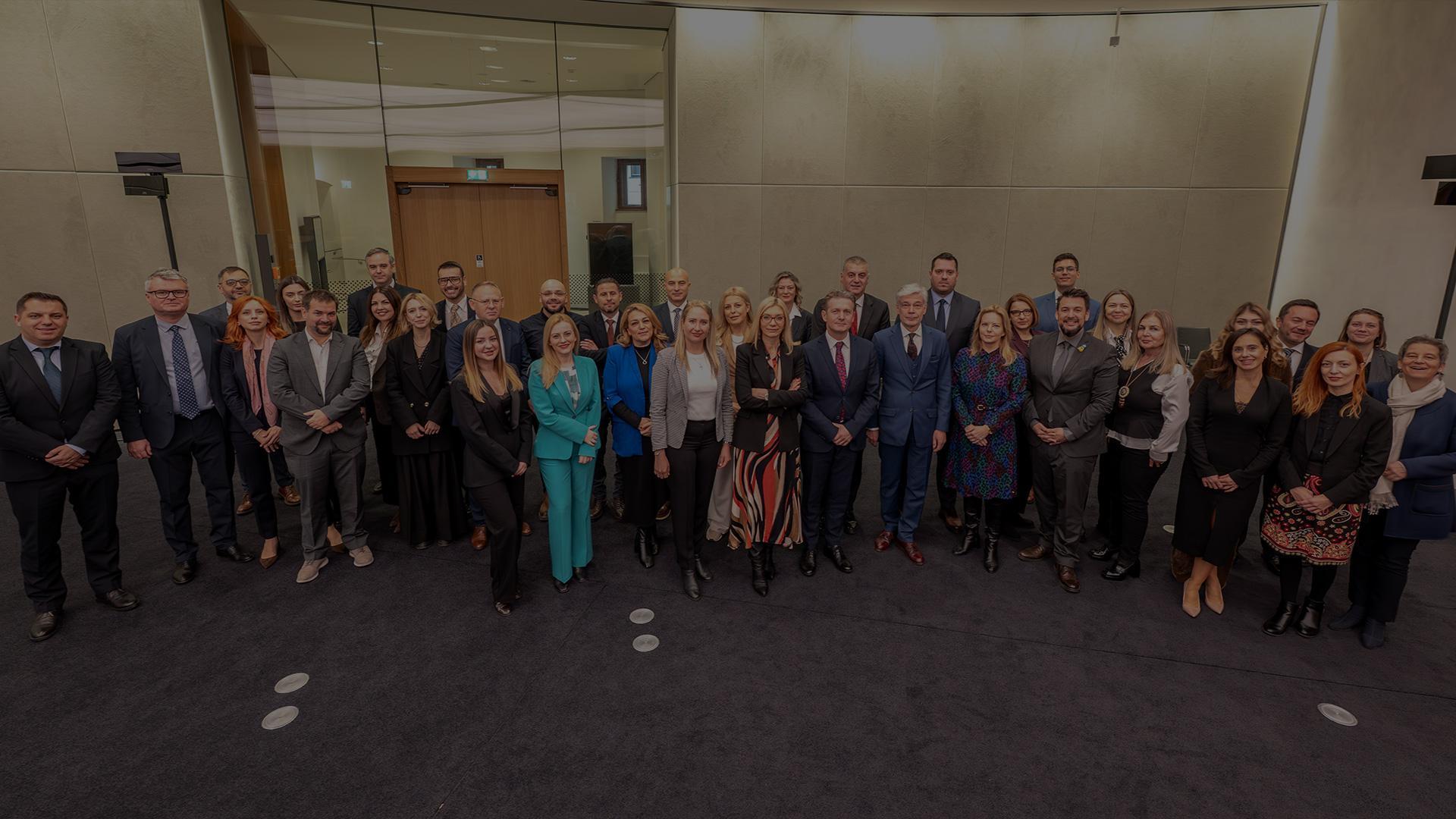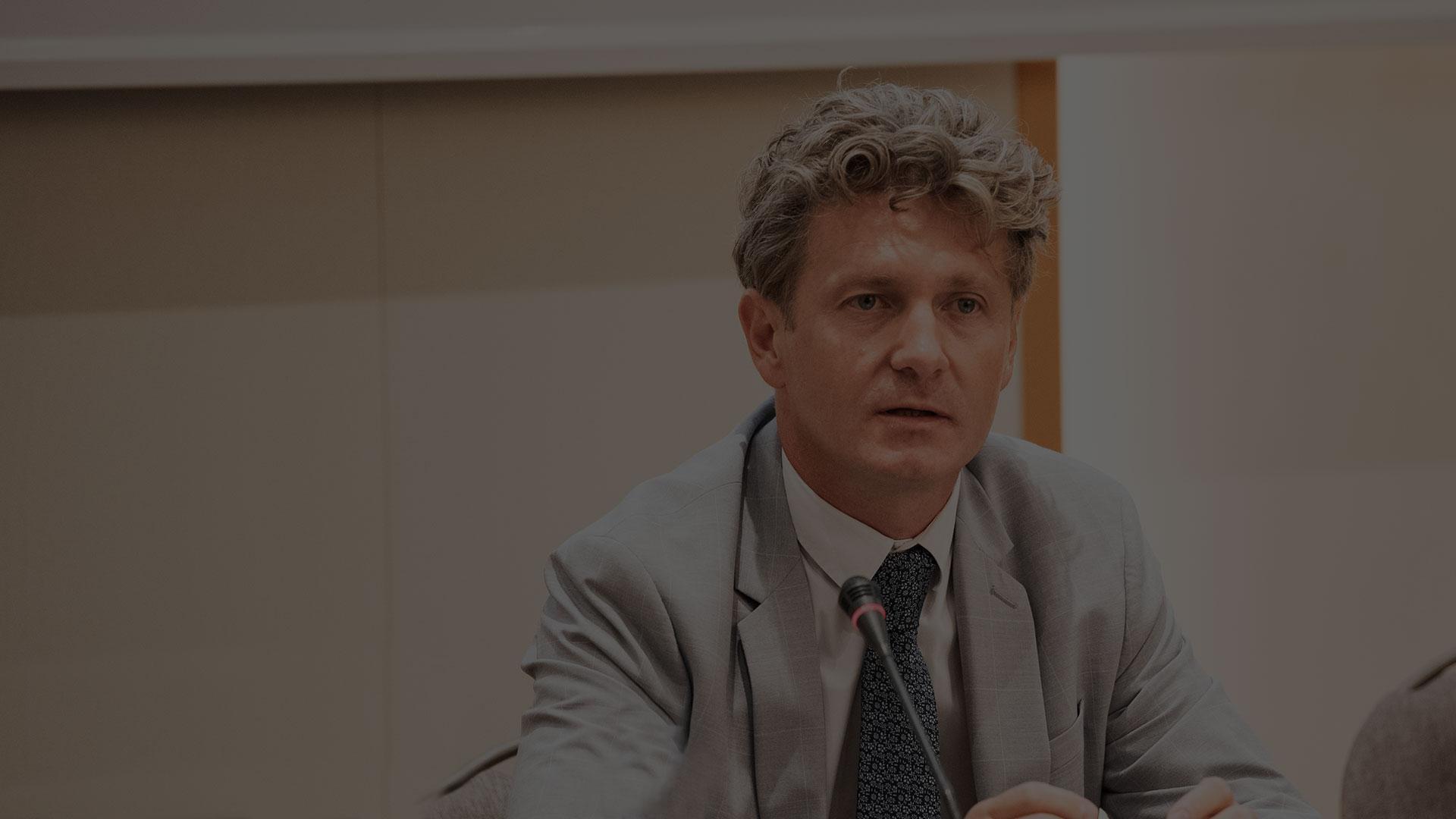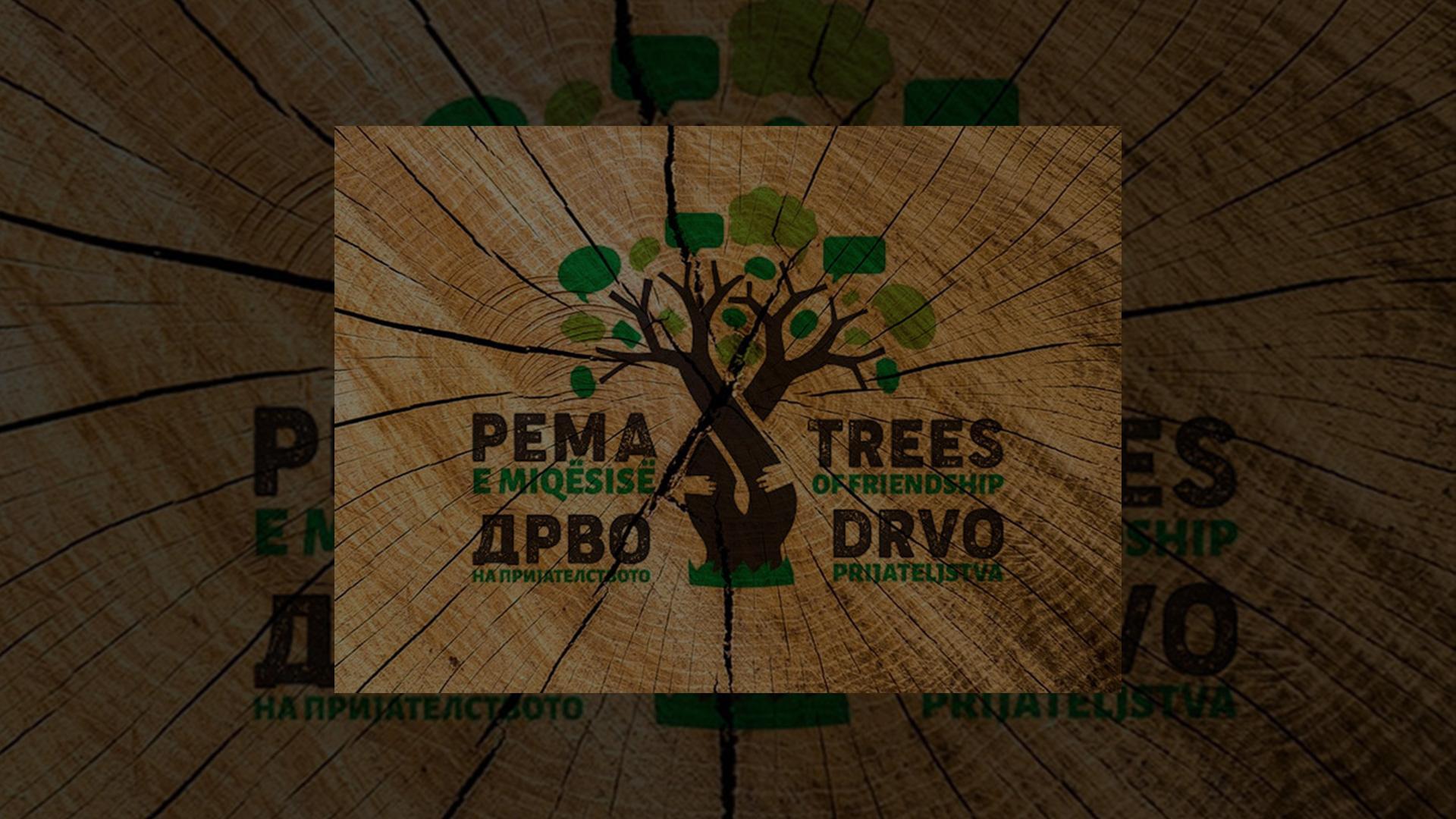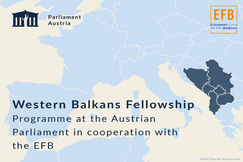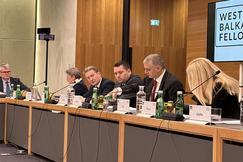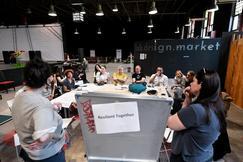

The Balkans in Europe Policy Advisory Group (BiEPAG) is a cooperation initiative of the European Fund for the Balkans (EFB) and Centre for the Southeast European Studies of the University of Graz (CSEES) with the aim to promote the European integration of the Western Balkans and the consolidation of democratic, open countries in the region.
READ MORE


The European Fund for the Balkans (EFB) and the Institute for Democratic Engagement Southeast Europe (IDESE) joined forces and created the Engaged Democracy Initiative (EDI). EDI aims to involve local movements and organizations, researchers, social businesses, engaged citizens and journalists in a hierarchless and horizontal regional network (rhizome) for supporting, promoting and pursuing values of open, solidary and democratic societies across our region.
READ MORE


In order to support the countries of the Western Balkans on their way to the European Union, the Austrian Parliament, along with the European Fund for the Balkans (EFB) and with generous support of the ERSTE Foundation, launched the fellowship program for MPs of the WB6 parliaments in March 2019. The EFB Fellowship at the Austrian Parliament is a practice-oriented educational programme for civil servants working at the national parliaments of Western Balkan countries. The purpose of the programme is to give impetus to the EU integration-driven reforms of the Western Balkan parliaments’ administrations, by means of building the capacities of individual agents of change.
READ MORE


The Joint History Project for all countries of Southeast Europe enters a new phase. Based on the seminal work of hundreds of historians and teachers from Southeast Europe from 1998 to 2016 in producing workbooks in eleven languages which span from the Ottoman Empire to the Cold War and the Transition in Europe, this follow-up will seek to engage young and new audiences in the digital sphere.
READ MORE


In 2017, the European Fund for the Balkans launched The Berlin Process Resource and Information Center designed as a one-stop info point for all information pertaining to the Berlin Process.
READ MORE


The Civil Society Forum is a platform enabling dialogue between Balkan citizens and regional and European decision-makers, within the Berlin Process. Its goal is to ensure civil society participation in the deliberation and creation of policies tailored to bring the countries of the region closer to each other and to anchor them in the European Union.
READ MORE

Chair of the EFB Steering Committee
The European Fund for the Balkans has managed to maintain its clear and relevant focus on the future integration of the Balkan countries and societies into the EU, with an ability to constantly adjust its programmes according to the ever changing environment. The King Baudouin Foundation is confident that by building upon its outstanding results so far, and more specifically onto new democratisation processes, the Fund is well equipped to for future challenges. We therefore look forward to our continuing involvement in this stimulating endeavour.

Former Member of the EFB Steering Committee
Since its inception in 2007 the European Fund for the Balkans has evolved into an independent player in the region which supports democratic development and European Integration in all the Balkan countries. We are convinced that in doing so the Fund will contribute to forming a unified Europe of which the Balkans will be an integral part. We at the Robert Bosch Stiftung greatly look forward to continuing our successful cooperation.

Member of the EFB Steering Committee
In the last period the European Fund for the Balkans has built a large network of professionals who today are shouldering the responsibility for a European and democratic development of their countries. As one of the founding institutions, ERSTE Foundation is proud of and happy for the achievements of the EFB and we are looking forward to continuing working with the Fund in helping it shape and orient its vision and work to the needs and aspirations of the people of Southeast Europe.

The European Fund for the Balkans is a testimony to the power of collaboration at multiple levels, across countries and regions! The EFB profiled itself as an institution that bridges the gap between the Balkans and the European Union. It grow into a flexible, innovative platform that brings together the region, its key reform actors and the society at large, in their efforts to strengthening participatory democracy and the EU approximation process of the Western Balkans.
The most important EFB legacy is the broad network of individuals with powerful skills and capacities, generated via its instruments and programs. A massive investment in building this human capital, by boosting the potentials of the most motivated and engaged parts of different sectors including the government, civil society, media, academia and business, contributed to developing a region-wide knowledge base and valuable resource ready to get integrated in the evelopment scenarios of the WB countries and in working on common interests of the region and the European Union.

The cooperation with the European Fund for the Balkans for the "Balkans United for Clean Air " campaign opened a completely new perspectives for Eco Forum Zenica. In addition to meeting new friends, sharing experiences with them and getting new ideas for action, we also got a new incentive to act. The solidarity of environmental activists in the area of the Western Balkans breaks down barriers between people, gives us strength when we are tired and encourages us that we are not alone. We sincerely hope that such campaigns will yield results and that we will finally breathe the air we deserve.

The EFB has been an indispensable actor in the Western Balkans in promoting the European integration of the region, in building capacities and advancing the importance of evidence-based policy process. As partner with the EFB in the Balkans in Europe Policy Advisory Group, I am delighted to work with colleagues form the Western Balkans and EU on shaping the debate on how promote the Western Balkans a prosperous and democratic part of the European Union. What sets the EFB apart from other initiatives is its emphasis on creative approaches, direct engagement and finding novel ways of engage both in the Western Balkans and in the EU.

The Balkans are a complex place to inhabit.
The Balkans are between stimulus and response.
It mirrors Europe in many ways, with all of its differences and specificities, like its people!
and …the Balkans are in need of change.
Yet, the slow pace of change may require quick personal adaptation by those who create and apply policies.
Only cross-regional collaboration will make each of the Balkan countries grow and prosper.
The purpose behind my passionate involvement with the EFB community was to help grasp this big EU/Balkans picture – – and do so faster and clearer…
and responsibly, which is a feature shared by all of my fellow EFB community members – potentially influential and change-making citizens of the Balkans!

The European Fund for Balkans has a specific role in the regional community since its Engaged Balkans Initiative is oriented towards local small initiatives that have difficulties becoming sustainable. This is extremely valuable, especially as EFB is supporting that aspect of the regional cooperation that was missing. Being part of the Engaged Democracy Initiative with EFB is an enriching experience for me and very helpful for connecting the local movements. Also, EFB's efforts to bring those voices to the European level are precious.

“As a trainer and consultant I have been following EFB´s remarkable efforts in regional reconciliation and capacity building for more than ten years. The passionate and visionary work of EFB is only topped by its outstanding achievements, manifested in the social capital created. I became a fan – and a friend!”

Balkans Beyond Borders would not have existed without the SEE and EU Leadership Development Programme as it was created during the LDP 2009. Through this programme, EFB has managed to create a real network of young professionals, devoted to improving the region’s reality and who very often support each other in organizing activities.
The Leadership Development Programme gave motive to 6 young professionals from 5 different countries of Southeast Europe to create the Balkans Beyond Borders Short Film Festival in order to enhance the cooperation among Balkan peoples and the Balkans closer to the EU through the art of short film making and use of new media. The EFB’s contribution has been crucial for BBB as it helped us in organising a few editions of the successful short film festival in the past years, as well as the first BBB Short Film Festival through the LDP programme.

(Participant in the Southeast Europe and EU Leadership Development Programme 2012/2013)
My participation in the Southeast Europe and EU Leadership Development Programme organized by European Fund for the Balkans was an amazing and intense experience. I feel grateful for having that learning opportunity in the field of international affairs and European Union. The know-how and skills gained through the LDP shaped my career as a public servant in Albania, but the most valuable contribution to my life are the people I met through the program – from organizers, lecturers, experts to my classmates, most of which I still maintain contact with; and some of them I consider closest friends, if not family. Amongst numerous academic and professional programmes I’ve attended, LDP stands among at the best out of them.

As the Executive Director of the CDRSEE, a regional impact-oriented organization, I saw a potential cooperation with the European Fund for the Balkans as a most natural one. Sometimes, however, similar program goals are not enough for a successful cooperation. Sharing the same enthusiasm and similar work philosophy is a prerequisite to having a genuine conversation in the first place. It turned out that these elements were in place, which was a great motivation in implementing a project that was challenging in many ways.
Vicinities has remained a standard that no one has managed to repeat. We succeeded, for the first time ever, in preparing and broadcasting a current affairs news talk show series on eleven TV stations, in Albania, Bosnia and Herzegovina, Croatia, Kosovo, North Macedonia, Montenegro, Slovenia, and Serbia. TV stations throughout the region, even nowadays, are re-broadcasting some of the episodes.
Vicinities has set an example of a good regional and CSO cooperation based on trust, respect, and unity regarding the values which we not only promote but apply, practice, and demonstrate.

The Leadership Development Programme remains one of my favourite experiences in personal and professional growth. I remember it as a dynamic and quite unique journey of joint learning and cooperation. The study of EU – Western Balkans relations I gained under LDP had successfully shaped some of my future projects, activities and challenges.
What I liked the most was the semi-academic approach, intensive reading and open discussions, combined with group projects and networking, which I still find essential for building long-term stability and cooperation in the region. I guess I have been lucky enough to be part off LDP at the beginning of my career and I always look forward to meeting again dear LDP colleagues Europewide.

EFB Fellow at the Austrian Federal Ministry for Transport, Innovation and Technology (Fellowship Programme for Government Officials from the Western Balkans)
The EFB programme was a once-in-a-lifetime experience to me, both professionally and personally. This fellowship was based on a multidimensional approach: alongside the official hours spent at the Ministry, which included independent work, meetings, discussions and working groups, I had the opportunity to participate in trainings on the EU, on international issues and in my field of expertise. Being an EFB fellow is a unique and stimulating experience. It allowed me to gain invaluable insights into the European principles of public administration.



